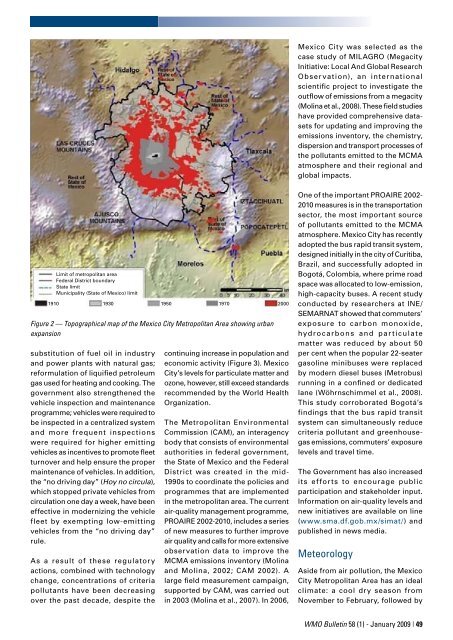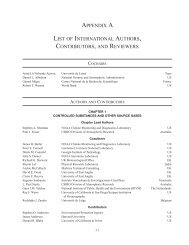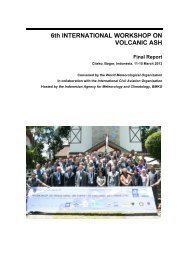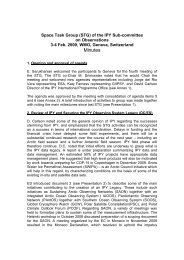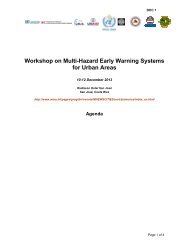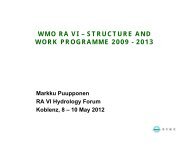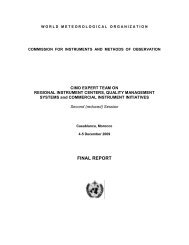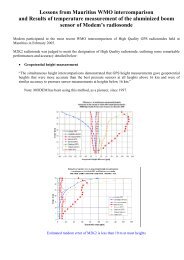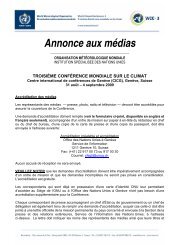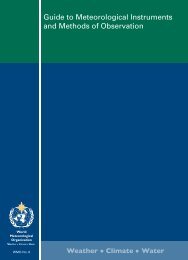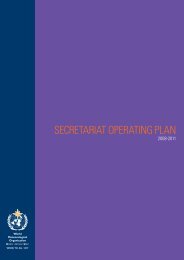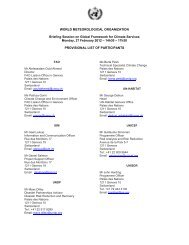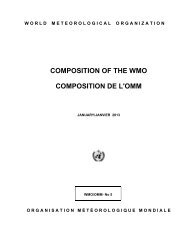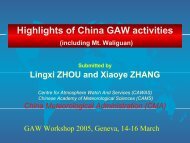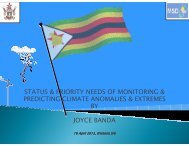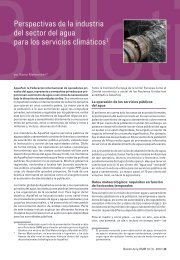Weather, climate and the air we breathe - WMO
Weather, climate and the air we breathe - WMO
Weather, climate and the air we breathe - WMO
You also want an ePaper? Increase the reach of your titles
YUMPU automatically turns print PDFs into web optimized ePapers that Google loves.
Limit of metropolitan area<br />
Federal District boundary<br />
State limit<br />
Municipality (State of Mexico) limit<br />
1910 1930 1950 1970 2000<br />
Figure 2 — Topographical map of <strong>the</strong> Mexico City Metropolitan Area showing urban<br />
expansion<br />
substitution of fuel oil in industry<br />
<strong>and</strong> po<strong>we</strong>r plants with natural gas;<br />
reformulation of liquified petroleum<br />
gas used for heating <strong>and</strong> cooking. The<br />
government also streng<strong>the</strong>ned <strong>the</strong><br />
vehicle inspection <strong>and</strong> maintenance<br />
programme; vehicles <strong>we</strong>re required to<br />
be inspected in a centralized system<br />
<strong>and</strong> more frequent inspections<br />
<strong>we</strong>re required for higher emitting<br />
vehicles as incentives to promote fleet<br />
turnover <strong>and</strong> help ensure <strong>the</strong> proper<br />
maintenance of vehicles. In addition,<br />
<strong>the</strong> “no driving day” (Hoy no circula),<br />
which stopped private vehicles from<br />
circulation one day a <strong>we</strong>ek, have been<br />
effective in modernizing <strong>the</strong> vehicle<br />
fleet by exempting low-emitting<br />
vehicles from <strong>the</strong> “no driving day”<br />
rule.<br />
As a result of <strong>the</strong>se regulatory<br />
actions, combined with technology<br />
change, concentrations of criteria<br />
pollutants have been decreasing<br />
over <strong>the</strong> past decade, despite <strong>the</strong><br />
continuing increase in population <strong>and</strong><br />
economic activity (Figure 3). Mexico<br />
City’s levels for particulate matter <strong>and</strong><br />
ozone, ho<strong>we</strong>ver, still exceed st<strong>and</strong>ards<br />
recommended by <strong>the</strong> World Health<br />
Organization.<br />
The Metropolitan Environmental<br />
Commission (CAM), an interagency<br />
body that consists of environmental<br />
authorities in federal government,<br />
<strong>the</strong> State of Mexico <strong>and</strong> <strong>the</strong> Federal<br />
District was created in <strong>the</strong> mid-<br />
1990s to coordinate <strong>the</strong> policies <strong>and</strong><br />
programmes that are implemented<br />
in <strong>the</strong> metropolitan area. The current<br />
<strong>air</strong>-quality management programme,<br />
PROAIRE 2002-2010, includes a series<br />
of new measures to fur<strong>the</strong>r improve<br />
<strong>air</strong> quality <strong>and</strong> calls for more extensive<br />
observation data to improve <strong>the</strong><br />
MCMA emissions inventory (Molina<br />
<strong>and</strong> Molina, 2002; CAM 2002). A<br />
large field measurement campaign,<br />
supported by CAM, was carried out<br />
in 2003 (Molina et al., 2007). In 2006,<br />
Mexico City was selected as <strong>the</strong><br />
case study of MILAGRO (Megacity<br />
Initiative: Local And Global Research<br />
Observation), an international<br />
scientific project to investigate <strong>the</strong><br />
outflow of emissions from a megacity<br />
(Molina et al., 2008). These field studies<br />
have provided comprehensive datasets<br />
for updating <strong>and</strong> improving <strong>the</strong><br />
emissions inventory, <strong>the</strong> chemistry,<br />
dispersion <strong>and</strong> transport processes of<br />
<strong>the</strong> pollutants emitted to <strong>the</strong> MCMA<br />
atmosphere <strong>and</strong> <strong>the</strong>ir regional <strong>and</strong><br />
global impacts.<br />
One of <strong>the</strong> important PROAIRE 2002-<br />
2010 measures is in <strong>the</strong> transportation<br />
sector, <strong>the</strong> most important source<br />
of pollutants emitted to <strong>the</strong> MCMA<br />
atmosphere. Mexico City has recently<br />
adopted <strong>the</strong> bus rapid transit system,<br />
designed initially in <strong>the</strong> city of Curitiba,<br />
Brazil, <strong>and</strong> successfully adopted in<br />
Bogotá, Colombia, where prime road<br />
space was allocated to low-emission,<br />
high-capacity buses. A recent study<br />
conducted by researchers at INE/<br />
SEMARNAT sho<strong>we</strong>d that commuters’<br />
exposure to carbon monoxide,<br />
hydrocarbons <strong>and</strong> particulate<br />
matter was reduced by about 50<br />
per cent when <strong>the</strong> popular 22-seater<br />
gasoline minibuses <strong>we</strong>re replaced<br />
by modern diesel buses (Metrobus)<br />
running in a confined or dedicated<br />
lane (Wöhrnschimmel et al., 2008).<br />
This study corroborated Bogotá’s<br />
findings that <strong>the</strong> bus rapid transit<br />
system can simultaneously reduce<br />
criteria pollutant <strong>and</strong> greenhousegas<br />
emissions, commuters’ exposure<br />
levels <strong>and</strong> travel time.<br />
The Government has also increased<br />
its efforts to encourage public<br />
participation <strong>and</strong> stakeholder input.<br />
Information on <strong>air</strong>-quality levels <strong>and</strong><br />
new initiatives are available on line<br />
(www.sma.df.gob.mx/simat/) <strong>and</strong><br />
published in news media.<br />
Meteorology<br />
Aside from <strong>air</strong> pollution, <strong>the</strong> Mexico<br />
City Metropolitan Area has an ideal<br />
<strong>climate</strong>: a cool dry season from<br />
November to February, follo<strong>we</strong>d by<br />
<strong>WMO</strong> Bulletin 58 (1) - January 2009 | 9


